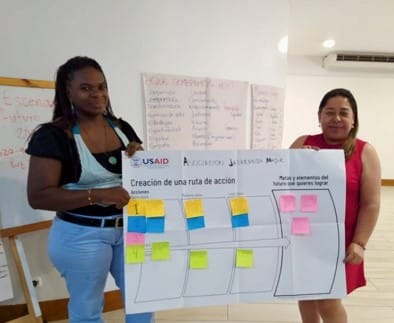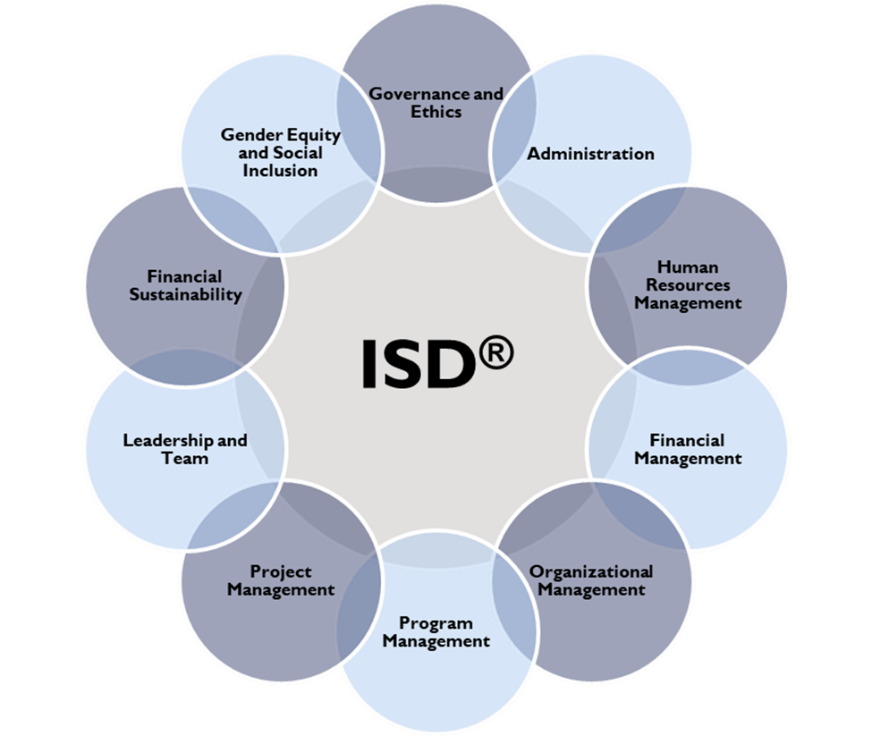By Rashmi Ekka, Project Director and D’wayne Copper, Project Associate, Connexus

“The impact began from the first pillar of Governance and Ethics! We were just going blindly, but then we realized it’s not just about meeting and joining forces. There’s more to it, such as strategic planning and having established financial and administrative documents, identifying allies, recognizing our impact on the community, and understanding the necessary roles for growth.”
– Nelly Pavi Trochez, Jacaranda Mujer
In the heart of Caloto, Cauca, Jacaranda Mujer, a civil society organization (CSO), is working to change the landscape of gender dynamics, advocating for equity and bolstering women’s involvement in political life. Despite their ambitions, they’ve faced significant challenges, including unclear direction and leadership, hindering their potential impact.
Their transformative journey began when they joined USAID Colombia’s Generating Equity program. Understanding the vital role of CSOs like Jacaranda Mujer, Connexus Corporation was tasked with providing organizational development technical assistance (TA) to strengthen the entire local gender ecosystem. Utilizing its proprietary Impact Strengthening Development® (ISD®) Toolkit (See Figure 1), Connexus commenced with a baseline organizational assessment, revealing critical issues within Jacaranda Mujer, including centralized control, diminished member engagement, and internal disarray.
In response, Connexus and Jacaranda Mujer co-developed a technical assistance plan, prioritizing the organization’s priorities. A series of collaborative sessions on Governance & Ethics empowered Jacaranda Mujer’s members to chart their core needs, set clear goals, and map out a cohesive strategy for the future. The outcome was a crystallized mission and vision accompanied by a strategic roadmap that revitalized member commitment and set the organization on a path to sustainable growth.
Connexus played a crucial role in the evolution of Women In Connection (WIC) by guiding them in establishing effective systems and aligning with international standards. This partnership significantly improved WIC’s operational efficiency and governance and increased its ISD® scores. At the end of the TA engagement, WIC graduated to mature status and is positioned to successfully bid for USAID funds.

Figure 1: ISD Pillars
Connexus’ approach to localization is rooted in local leadership and participatory co-creation. Using our proprietary ISD® Toolkit, Connexus conducts capacity assessments to identify local partners’ strengths, weaknesses, and priorities across 10 pillars. The assessment informs the co-creation of an Organizational Capacity Development Plan (OCDP), and Connexus then provides tailored TA aligned with the OCDP. The process culminates in a reassessment to gauge progress and plan future steps. The ISD® Toolkit is powered by our online platform through which we conduct assessments and track progress.
Key to Connexus’ success in local capacity strengthening under Generating Equity are several approaches:
- Inclusive Partner Selection Process: Emphasizing a holistic approach, engaging a wide spectrum of stakeholders, and spotlighting under-tapped local game-changers.
- Diversity of Partners: Prioritizing a mix of partners, balancing collaboration between national-level players and grassroots trailblazers, and focusing on scalable, innovative approaches.
- Economies of Scale: Utilizing scalable TA toolkits, networking for optimal knowledge spread, and blending different modalities of knowledge transfer methods, including high-tech and high-touch approaches.
- Tiered Service Delivery: Offering varied levels of TA tailored to the organization’s size and maturity and scaling interventions accordingly.
- Iterative Monitoring and Feedback Loops: Continuously validating the impact of organizational development TA and harnessing feedback for ongoing optimization.
2023 has shown that the strategic collaboration between USAID, Connexus, and local entities amplifies impact, equipping grassroots organizations to stand as pillars of change and aligning with USAID’s mandate of fostering localization.





